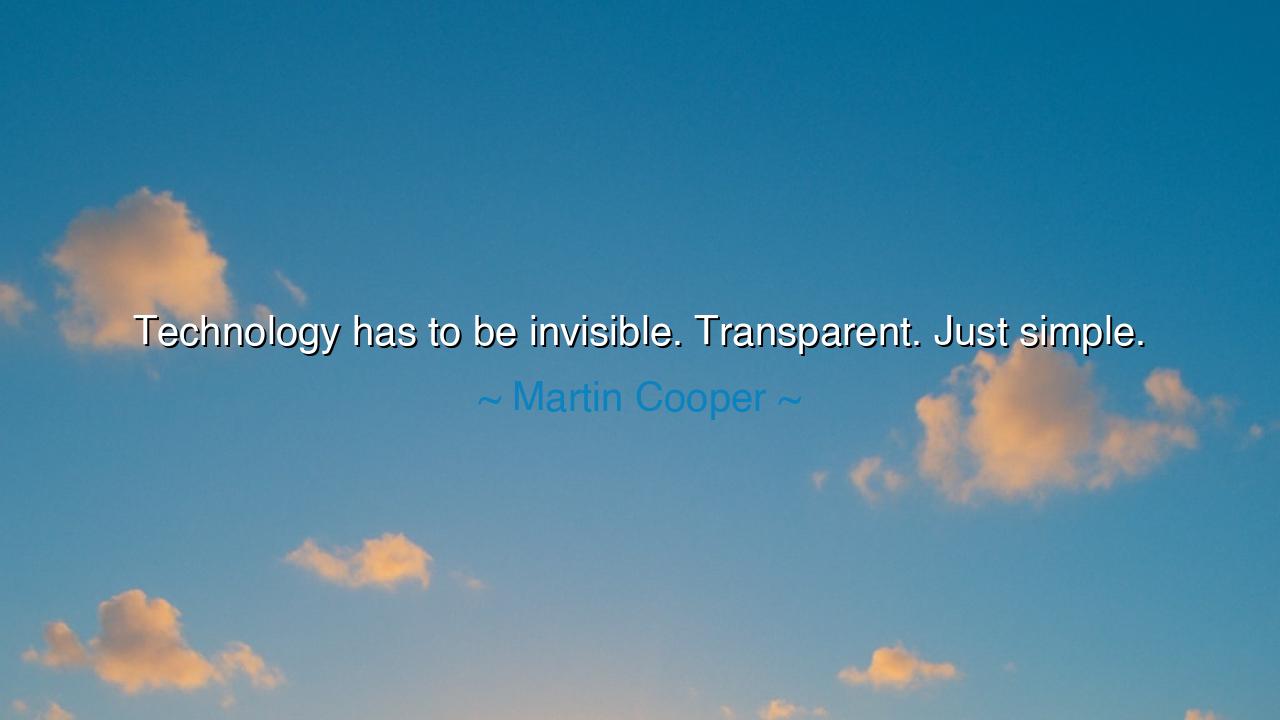
Technology has to be invisible. Transparent. Just simple.






The words of Martin Cooper, father of the mobile phone and pioneer of modern communication, carry the force of simplicity clothed in wisdom: “Technology has to be invisible. Transparent. Just simple.” In this statement lies a profound truth about the nature of invention. Technology is not meant to dazzle with complexity, nor to burden the soul with complication. Its highest purpose is to serve quietly, to vanish into the background of life, so that the human spirit may remain free to think, to dream, and to connect.
The meaning begins with the call for invisibility. The greatest tools of mankind are not those that shout their presence, but those that become extensions of the human hand, the human mind, and the human heart. The wheel is no longer noticed as miraculous, yet it undergirds all movement. Fire, once worshipped as divine, now burns unnoticed in every stove. So too must modern tools vanish from consciousness, leaving only the ease of their service. Technology, at its best, is like air: unseen, yet life-giving.
The second truth is transparency. When technology is transparent, it does not confuse, frustrate, or erect barriers. It aligns itself with human instinct, so that even the unlearned can use it with grace. This is why the tools that endure are those that simplify rather than complicate. The alphabet, the clock, the map — each took the mysteries of time, space, and language, and made them clear to all. When tools are transparent, they do not diminish human capacity; they amplify it.
History gives us many mirrors. Consider the creation of the printing press by Johannes Gutenberg. Before it, books were rare treasures locked away in monasteries. His invention did not draw attention to itself but rather made the written word simple, invisible, and transparent to the common person. The press itself vanished into the background while the ideas it spread transformed the world. Or think of Alexander Graham Bell’s telephone. Its power was not in the device itself, but in its ability to make distant voices seem close, to collapse miles into moments. These inventions worked best not when people marveled at the machine, but when they forgot it was there at all.
Yet Cooper’s words also carry a warning. When technology overwhelms with complexity — when it demands constant attention, endless updates, or confuses the user — it ceases to be a servant and becomes a master. Such tools no longer liberate but enslave. The wise must therefore demand that invention remain simple, accessible, and human-centered. Complexity for its own sake is vanity; simplicity for the sake of humanity is wisdom.
The lesson for us is timeless: seek simplicity, not spectacle. When choosing tools for life, let them be those that free your mind rather than clutter it, that deepen connection rather than distract from it. True mastery is not in wielding what is complicated, but in dwelling peacefully with what is simple and effective. As the ancients prized clarity of thought, so must we prize clarity in our inventions.
Practical action flows from this truth. Embrace technologies that serve quietly, that disappear into the background while enhancing your purpose. Avoid being seduced by tools that draw more of your attention than they deserve. Strive to simplify not only your devices but also your life, so that your energy is spent not on managing machines but on nurturing relationships, pursuing wisdom, and fulfilling your calling.
Thus, let Cooper’s words be remembered as a commandment for the age of innovation: “Technology has to be invisible. Transparent. Just simple.” The most powerful tools are those that vanish from view, leaving only their gift behind. Let us, then, create and embrace technologies that disappear into usefulness, so that the human soul remains at the center, unburdened, unchained, and free to flourish.






AAdministratorAdministrator
Welcome, honored guests. Please leave a comment, we will respond soon